The sleep dilemma: recognising insomnia
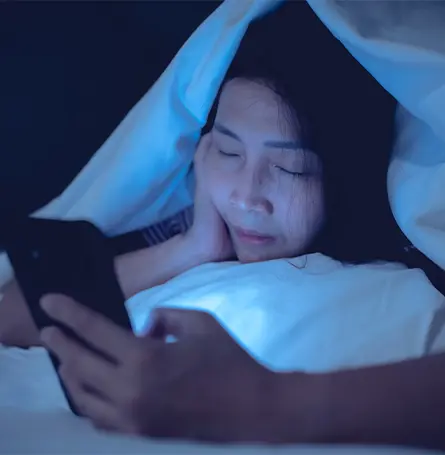
Before we get into the study's specifics, let's set the stage. Insomnia is a widespread issue, affecting millions of people. It's characterised by difficulties falling asleep, staying asleep, or waking up too early and not being able to get back to sleep.
The consequences go beyond tossing and turning; insomnia can lead to fatigue, mood disturbances, and trouble concentrating during the day.
But here's the challenge: traditionally, insomnia is diagnosed based on self-reported symptoms. Individuals fill out questionnaires, maintain sleep diaries, or participate in clinical interviews to assess their sleep quality. While these methods provide valuable insights, they rely heavily on an individual's perception of their sleep.
This is where wearable sleep devices like Fitbits and EEG headbands come into play. These devices monitor your sleep patterns throughout the night, using data like your heart rate and movement to track when you're asleep, awake, or in a light sleep phase. But how well do these devices align with our own perception of our sleep quality? As it turns out, it's not a perfect match.
The sleep-wake state discrepancy: what's going on?
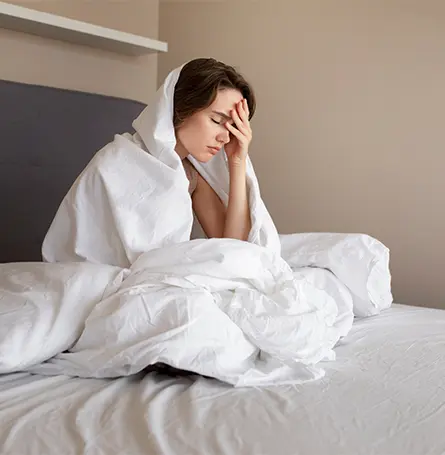
The study we're discussing focuses on something called the sleep-wake state discrepancy. In simpler terms, it's the difference between what you think your sleep was like and what your wearable device says. This disconnect can be pretty common, and it's not just in people with insomnia; it can affect a wide range of sleep patterns.
The most typical scenario is when your device tells you that you took longer to fall asleep or spent more time awake during the night than you remember. But it can go in the opposite direction as well. It's like your Fitbit saying one thing, and your body feeling another.
Researchers wanted to find out if providing people with guidance on how to interpret the data from their wearable sleep devices and thus lower this discrepancy could actually make a difference in their sleep quality.
And as it turns out, the results were mostly positive, with the most participants in the affected group showcasing lower scores on the Insomnia Severity Index.
The study: Fitbits, EEG headbands, and sleep education
A total of 113 individuals with significant insomnia symptoms participated in the study. They were divided into two groups. The first group received feedback about their sleep using wearable devices like Fitbits and EEG/Dreem headbands.
They were also given guidance on how to interpret the data and were closely monitored throughout the study. The second group, the control group, received sleep education and sleep hygiene information.
Both groups had one individual session and two check-in calls with the researchers to track their progress. The primary goal was to assess the severity of their insomnia symptoms, but researchers also looked at secondary outcomes, including sleep disturbance, sleep-related impairment, depression, and anxiety.
The results: can wearable devices improve sleep?
So, what did the study find? Well, it turns out that providing feedback and guidance on sleep data from wearable devices did make a difference. The group that received this intervention experienced a reduction in insomnia severity and sleep disturbance. It seemed like understanding their sleep patterns better had a positive impact on their sleep quality.
However, there's a twist. While there were clear improvements in insomnia symptoms and sleep disturbance, there were no significant changes in other aspects of sleep, like total sleep duration, sleep onset latency (the time it takes to fall asleep), and wake after sleep onset (the time spent awake during the night). In essence, the participants' sleep-wake state discrepancy didn't vanish entirely.
What does it all mean?
This study's results offer some intriguing insights. It suggests that understanding and interpreting the data from your wearable sleep device can indeed reduce insomnia symptoms and sleep disturbance. It's like shining a light on your sleep patterns, making them more tangible and manageable.
But, before you rush to buy a sleep device, there are a few things to consider. The improvements seen in this study were modest when compared to established treatments like cognitive-behavioral therapy for insomnia (CBT-I). CBT-I typically delivers more significant results, but it can be more difficult to put into practice as you need a licenced professional.
So, what's the takeaway here? If you're struggling with sleep, wearable sleep devices might offer some benefits. They can help you understand your sleep patterns better and, in turn, reduce insomnia symptoms.
And the reasoning is quite simple – people tend to have a lot of anxiety surrounding their sleep. They might think that they're getting less sleep than they actually are or that the amount they're getting isn't sufficient. And this handy little sleep gadget simply lets them know where they actually stand.
However, these devices aren't a magic solution on their own. It's essential to approach insomnia with a holistic mindset, including elements like cognitive-behavioural therapy, which addresses cognitive factors contributing to insomnia. But we'll go into more detail on that in just a bit.
How understanding your sleep cycles can help you
Now that we hopefully all understand the study and what it has set out to do, we'd like to go a bit more in-depth on the topic in our own right. Namely, we're going to break down the two sides of this study and provide a bit more context and information.
So, we'll first talk about what sleep trackers are all about, what you should expect, and how to properly use one. Then we'll briefly discuss a few sleep hygiene tips that you can implement right away. After all, while sleep trackers were a big focus of this study, the group that learned good sleep hygiene also saw improvements.
So, by understanding both sleep hygiene and sleep trackers, you can decide for yourself which course of action will help you fall asleep and stay asleep in the long run.
How to use a sleep tracker
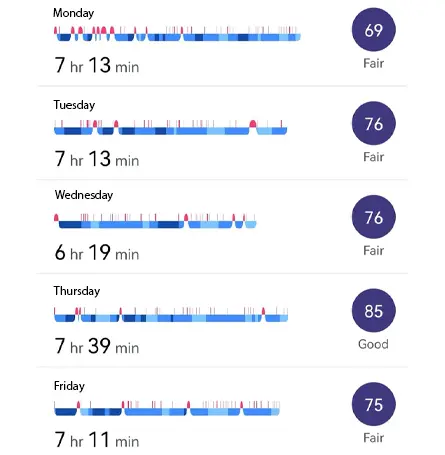
Since we've covered how to get a good sleeping tracker in the past, it shouldn't be a surprise that we're quite familiar with them. In fact, I personally use one of the trackers mentioned on our list – the Fitbit Inspire 2.
And seeing how the study also leaned on FitBits for the most part, we're going to go over what it's all about and the type of information you can get.
You generally want to wear the Fitbit on your non-dominant wrist, not making it too tight, and wear it during the night or even 24/7. And alongside other features, the app will let you see your sleep-tracking data in the morning.
In this image, you can see some of my results from the previous week. The app displays your total sleep duration at the bottom and your overall sleep score on the left.
Plus, that little line showcases how much REM or deep sleep you've had as well as how many times you've woken up during the night.
How to use sleep tracking information
Now that you know what your sleep tracking data is going to look like, let's make a few observations. First off, we can see that sleep duration isn't directly tied to sleep quality!
As you can see, the first two days have an identical sleep duration, however, Tuesday's reading shows a much higher rating. And on the other hand, on Wednesday, even though the sleep duration is the shortest of the week, it doesn't have the lowest rating.
Why is that?
Well, if we take a closer look at the first entry, we can see that the first half of the night showed multiple disturbances. So, if we'd liketo get a better night's sleep in the future, we can think back to what we did on Sunday that might have caused so many disruptions and adjust our sleep routine accordingly.
Mind you, this information might not be 100% accurate and this is just my personal example. However, it should showcase how staying informed can help you better your sleep quality overall. This is especially true if you pair it with proper sleep hygiene practices, which we will now discuss.
How to better your sleep hygiene
Something that a lot of people tend to overlook is how many different things can hamper sleep. This is likely why there are so many different sleep gadgets on the market. However, while it might seem overwhelming at first, practicing good sleep hygiene is by no means complicated.
Essentially, good sleep hygiene is all about helping your circadian rhythm stay consistent, avoiding activities that can negatively affect your sleep, and working on your mental health. We know that last one might seem a bit off but trust us, even the best sleep gadgets can't guarantee a good night's sleep if you're stressed out of your mind.
So, let's go over some of the most important practices of sleep hygiene. However, do keep in mind that this is not the entire list, as is an entire article by itself.
Keeping your circadian rhythm consistent
To oversimplify the matter, your circadian rhythm is like an internal clock that lets your body know when it should be full of energy and when it should start winding down. As you can imagine, this makes it quite important for dealing with insomnia.
There are several cues your circadian rhythm needs in order to “stay on track”. But the most important ones are your body temperature and light. So, to fall asleep fast and avoid poor sleep in general, you need to make getting these cues easy and consistent. In other words, you should:
- Go to bed and wake up at roughly the same time each day. The more consistent your sleeping schedule is, the easier it will be for your body to transition between sleep stages.
- Avoid bright lights at night. Light is like the go signal for our brain activity. So, avoid bright lights during the evening hours, especially when it comes to electronics and blue light. Having a sleep mask can also help in this department as it will block out any external lights. You can check out our favourite sleep masks right here.
- Make your room slightly colder. Since the temperature naturally lowers during the evening, our body temperature needs to drop for our brain to start winding down. So, try to keep your room a bit cool. But don't overdo it.
Activities you should avoid before bed
When it comes to activities you should ideally avoid during the evening, the list is a lot longer than many of us wish it was. However, it's usually not the end of the world to do these things, they just make it harder to have a consistent sleep schedule.
And the key concept here is overstimulation. During the evening, you want to completely wind down, not amp yourself up. In other words, you should avoid:
- Watching overly stimulating content. While we all like a good TV drama, if it's the last thing you see before going to bed, you might have more trouble getting restorative sleep. After all, you're bound to be thinking about that cliffhanger and you will be tempted to go to bed later than you should.
- Eating fatty, greasy or spicy foods. Certain foods need to be avoided during the evening as your body will have more trouble breaking them down, thus raising your body temperature and making sleep more evasive. However, some drinks, like warm milk, live up to the stories and actually help you fall asleep faster.
- Caffeine, smoking, and drinking. This shouldn't be a surprise to anyone. Caffeine blocks out sleep hormones, drinking leads to fractured sleep cycles, and smoking can cause withdrawal during the night, as well as making conditions such as sleep apnea more pronounced.
Keeping an eye on your mental health
Lastly, while caring for your mental health is a lifelong battle, and certainly easier said than done, there are a few things you can do to keep yourself calm at night. Of course, in the case that you're struggling with very serious issues or mental disorders, you should see a professional as soon as possible.
However, if you're just dealing with the daily grind of life, here are a few tips for making the transition into sleep a lot smoother. And since a good night's sleep often helps with maintaining proper mental health, these habits can be useful in both ways.
- Creating a calming bedroom – Your bedroom should be a place of respite. So, make sure that even just being in your bedroom brings forth a sense of calm. Even just properly storing your duvets can help declutter your room and make you feel more at peace.
- Creating a relaxing routine – Whether it's reading sleep stories, doing some breathing exercises, or listening to sleep sounds or white noise, creating a calming routine can help you both stay calm and fall asleep more easily.
- Utilising lights – Even just lighting up your bedroom properly can help you keep a more positive outlook during the day. Just make sure to tone the lights down once the evening rolls around.
Looking ahead: the future of sleep devices
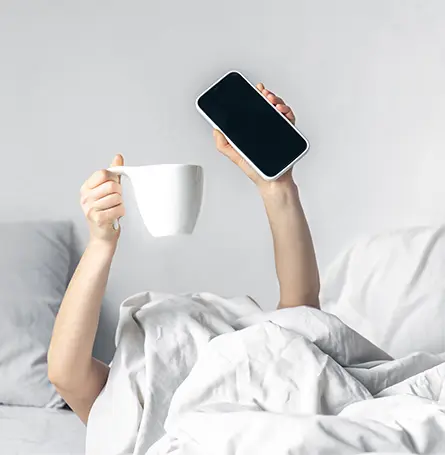
As consumer sleep devices become more popular, it's crucial to understand how to present sleep data to individuals effectively. This study underscores the importance of providing guidance alongside wearable sleep data, especially for individuals with pronounced sleep-wake state discrepancies. But, it also highlights that wearable sleep data alone may not be a complete solution for treating insomnia.
For those already using sleep devices, there might be potential in combining traditional treatments with wearable sleep data interpretation. Imagine taking the principles of cognitive-behavioural therapy and incorporating insights from your Fitbit or EEG headband. This fusion of old and new could be the key to unlocking even better sleep.
Wearable sleep devices can indeed be valuable tools for improving sleep, but they're most effective when used as part of a more comprehensive approach. And even small decisions that people might take for granted, like choosing the right mattress or the right pillow can be important in the grand scheme of things.
The future of sleep management might just be a blend of traditional wisdom and cutting-edge technology. So, if you're looking for a good night's sleep, remember, it's not about the device alone – it's about understanding your sleep on a deeper level.
Conclusion
In conclusion, knowledge is power. And just like it's important to understand how your sleeping device for insomnia can help better your sleep, understanding sleep hygiene can help you form healthy habits that will aid you in the long run.
With that being said, we do encourage you to read the original study, as this article is more of a guide or overview of their research. And, as these researchers have proven, knowing the facts has real-life benefits. Lastly, if you do have any questions or want to recommend a study you found particularly interesting, let us know in the comments.

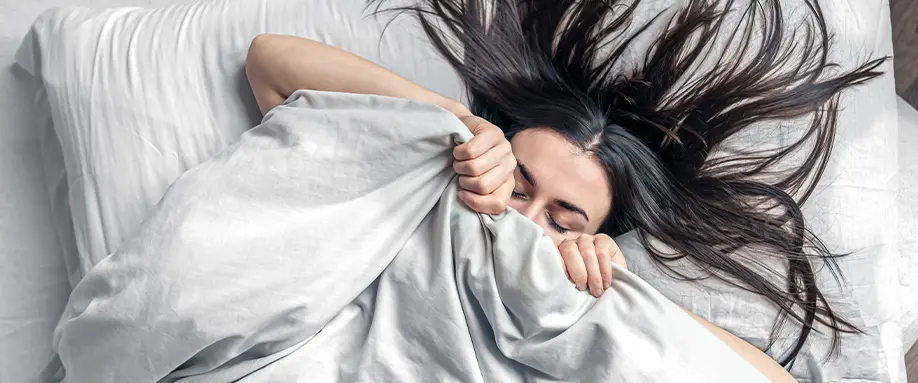











There are no comments yet
"*" indicates required fields